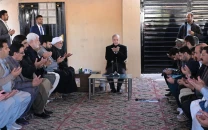Cause for cheer
In times as desperate as these, good news is scarce. But evidence that we retain basic human qualities is important.

In times as desperate as these, good news is scarce. But evidence that we retain basic human qualities is important — given that the reports of beating people to death, as was done in Sialkot with two brothers, or denying relief to specific groups of victims on the basis of their belief, as was done with Ahmadi flood affectees, throws this into question.
The story appearing in this publication of a different way of thinking offers us some hope. Across Sindh, Muslims driven away from their homes by the waters that continue to pour down the Indus have been taking refuge at Hindu and Sikh temples. They have been welcomed into these buildings with the greatest warmth and taken care of without discrimination. And they, in turn, have expressed gratitude and emphasised their feelings of brotherhood towards neighbours from other communities.
We need to hear more such stories. They show us that not all has been lost to bigotry. The harmony that has been exhibited indicates that if we can get past the doings of extremists and ignore their messages of hatred there is still a vein of humanity running through the soil of our land that we can tap. Our government needs to consider ways of promoting this spirit — by altering the text of school books, by doing more to prevent the abuse of minorities, including that done on the basis of the blasphemy laws, and by ensuring that they are given an equal place in society. The introduction of laws that encourage discrimination and the fact that we have allowed the tide of extremism to climb higher and higher means the society we live in today is a far more brutal place than the one we knew some years ago.
The accounts of cooperation and a desire to help each other indicates what we have lost can be regained. The demonstration of goodwill in Sindh suggests there is a willingness to do just this on the part of people themselves. They must receive every possible support and encouragement in this, so we can gain from the demonstration of goodwill and use it to regain the essential humanitarianism that seems to have slipped away from us bit by bit.
In times as desperate as these, good news is scarce. But evidence that we retain basic human qualities is important — given that the reports of beating people to death, as was done in Sialkot with two brothers, or denying relief to specific groups of victims on the basis of their belief, as was done with Ahmadi flood affectees, throws this into question.The story appearing in this publication of a different way of thinking offers us some hope. Across Sindh, Muslims driven away from their homes by the waters that continue to pour down the Indus have been taking refuge at Hindu and Sikh temples. They have been welcomed into these buildings with the greatest warmth and taken care of without discrimination. And they, in turn, have expressed gratitude and emphasised their feelings of brotherhood towards neighbours from other communities.We need to hear more such stories. They show us that not all has been lost to bigotry. The harmony that has been exhibited indicates that if we can get past the doings of extremists and ignore their messages of hatred there is still a vein of humanity running through the soil of our land that we can tap. Our government needs to consider ways of promoting this spirit — by altering the text of school books, by doing more to prevent the abuse of minorities, including that done on the basis of the blasphemy laws, and by ensuring that they are given an equal place in society. The introduction of laws that encourage discrimination and the fact that we have allowed the tide of extremism to climb higher and higher means the society we live in today is a far more brutal place than the one we knew some years ago. The accounts of cooperation and a desire to help each other indicates what we have lost can be regained. The demonstration of goodwill in Sindh suggests there is a willingness to do just this on the part of people themselves. They must receive every possible support and encouragement in this, so we can gain from the demonstration of goodwill and use it to regain the essential humanitarianism that seems to have slipped away from us bit by bit.
Published in The Express Tribune, August 24th, 2010.



















COMMENTS
Comments are moderated and generally will be posted if they are on-topic and not abusive.
For more information, please see our Comments FAQ